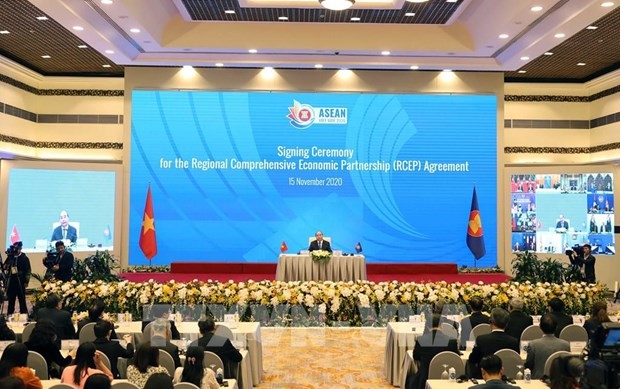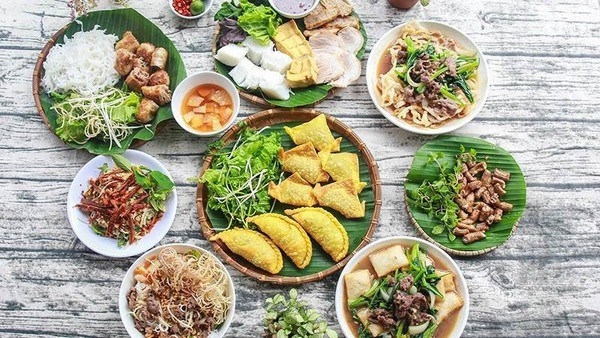Thai, Singaporean PMs highly evaluate signing of RCEP
Wednesday, November 18,2020
AsemconnectVietnam - Thai Prime Minister and Defense Minister Gen. Prayut Chan-o-cha and Singaporean Prime Minister Lee Hsien Loong welcomed the signing of the Regional Comprehensive Economic Partnership (RCEP) Agreement at the virtual 4th RCEP Summit held on November 15.
There have been tremendous challenges faced by the RCEP signatories during the negotiations due to the different levels of economic development and sensitivities while the recent COVID-19 pandemic has caused further difficulties.
Nevertheless, all RCEP countries have worked together tirelessly to overcome these challenges, he affirmed.
The RCEP agreement is not only the largest free trade agreement in the world but it is also characterised by its quality and standards, as well as its positive impact towards upgrading competitiveness and increasing economic benefits for all members.
Once coming into force, the Thai PM believed that the pact will create a conducive and attractive business environment for investment from global partners.
In turn, this will help all members to possess the capacity and resilience to manage future economic challenges while helping them to strongly recover from the impact of the ongoing pandemic.
Furthermore, the agreement will enhance the strategic value of ASEAN and the RCEP region and will also act as a catalyst in driving the global economy towards more free and open trade while strengthening the multilateral trading system. Subsequently, the region and its people will be able to reap the resulting economic benefits that are inclusive and sustainable.
The Thai PM witnessed the signing of the RCEP agreement between representatives of 15 member countries. Thailand was represented by Deputy PM and Commerce Minister Jurin Laksanawisit.
In his remarks, Singaporean PM Lee Hsien Loong called the signing of the agreement “a major step forward” at a time when multilateralism is losing ground, and global growth is slowing.
It signals the countries’ collective commitment to maintaining open and connected supply chains, and to promoting freer trade and closer interdependence especially in the face of COVID-19 when countries are turning inwards and are under protectionist pressures, he added.
Lee also noted that the diversity of the participating RCEP countries shows how economies at different stages of development can come together and contribute to each other's development, as well as to the multilateral trading system.
The diversity and the strong links that the participating countries have with the US, Europe and the rest of the world, also reflects the inclusiveness and openness of the agreement, he added.
The Singaporean PM also expressed hope that India will be able to join the RCEP in the future so that the agreement will fully reflect the emerging patterns of integration and regional cooperation in Asia.
The pact, which was first proposed in 2012, loops in 10 ASEAN economies along with China, Japan, the Republic of Korea, New Zealand and Australia.
They make up nearly a third of the world's population and account for 30 percent of global gross domestic product./.
Source: en.vietnamplus.vn/thai-singaporean-pms-highly-evaluate-signing-of-rcep/190449.vnp
RCEP a bright spot in bleak global economy
Prompt action needed to seize opportunities, navigate challenges under RCEP
Malaysia to get benefits from RCEP
RCEP creates new impetus to China-ASEAN cooperation: Singaporean scholar
Businesses advised to improve knowledge to optimize chances from RCEP
RCEP will not worsen trade deficit: ministry
Signatories highlight RCEP’s significance to economies
Australian minister highlights significance of RCEP amid global trade uncertainty
India, ASEAN striving to expand trade despite India’s exit from RCEP
RCEP in spotlight at 37th ASEAN Summit: The Strait Times
RCEP signing to take place online on November 14

Plan on implementing Decision No. 327/QD-TTG dated March ...
Concretize viewpoints, objectives, tasks and solutions of the plan in accordance with practical conditions of the locality, associating ...Plan on implementing national environmental protection ...
Implementation plan of marine aquaculture development ...
Program on conservation and development of Vietnamese ...
Plan on improving quality of human resources to 2025 and ...

Efforts taken to turn culinary culture into national ...
The Vietnam Cuisine Culture Association (VCCA) is taking steps to implement a project to build and develop Vietnamese culinary culture ...Vietnamese cuisine making a name for itself with ...
Vietnam advance to next round of AFC U20 Women’s Asian Cup
Cultural tourism and traditional values promoted through ...



